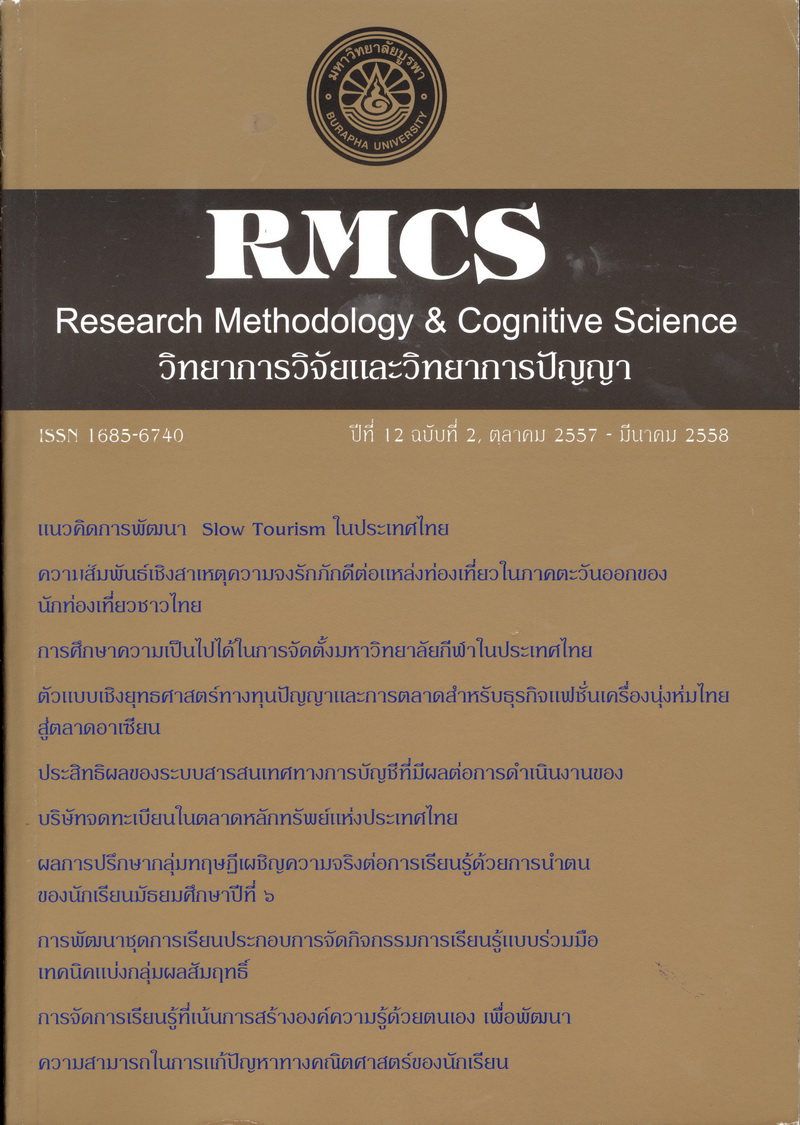ภาพลักษณ์ แรงจูงใจ และประสบการณ์ของนักท่องเที่ยวชาวต่างชาติที่ใช้บริการสปาไทย
Main Article Content
Abstract
บทความนี้มีวัตถุประสงค์เพื่อตรวจสอบอิทธิพลของภาพลักษณ์และแรงจูงใจที่มีต่อประสบการณ์การใช้บริการ สปาไทยของนักท่องเที่ยวชาวต่างชาติ ภายใต้แนวคิดการวิเคราะห์ความสัมพันธ์เชิงสาเหตุระหว่างภาพลักษณ์ แรงจูงใจ และประสบการณ์ของนักท่องเที่ยวที่ใช้บริการสปา โดยใช้แบบจําลองสมการโครงสร้าง (Structural Equation Modeling: SEM) วิเคราะห์ข้อมูลที่ได้จากการสัมภาษณ์นักท่องเที่ยวชาวต่างชาติที่ใช้บริการสปาในประเทศไทย แบบจําลองประกอบด้วย ตัวแปรแฝง 6 ตัวแปร เป็นตัวแปรแฝงภายนอก 2 ตัวแปร ได้แก่ ภาพลักษณ์ของสปาไทย และ แรงจูงใจในการใช้สปาไทย ตัวแปรแฝงภายในมี 4 ตัวแปร ได้แก่ คุณภาพการให้บริการ คุณค่าที่ได้รับ ความพึงพอใจรวม และพฤติกรรมในอนาคต
ผลการศึกษาปรากฏว่า แรงจูงใจในการใช้สปาไทยมีอิทธิพลต่อประสบการณ์และพฤติกรรมในอนาคตของ นักท่องเที่ยวชาวต่างชาติมากกว่าภาพลักษณ์ของสปาไทย โดยความมีชื่อเสียงของสปาไทยเป็นแรงดึงที่สําคัญ ขณะที่การ ให้บริการของพนักงานเป็นตัวบ่งชี้คุณภาพการให้บริการของสปาไทยที่สําคัญ สําหรับภาพลักษณ์ที่สําคัญของสปาไทย คือ ความเป็นไทย ผลลัพธ์ที่ได้แสดงให้เห็นว่า นโยบายการส่งเสริมการตลาดของสปาไทย ควรให้ความสําคัญกับแรงจูงใจ มากกว่าที่จะมุ่งนําเสนอภาพลักษณ์ของสปาไทยเพียงอย่างเดียว โดยให้ความสําคัญกับการนําเสนอบริการสปาที่เน้นการ ผ่อนคลายและ/ส่งเสริมสุขภาพ พร้อมทั้งเน้นความเป็นไทย (หรือ ไทยสปา) ขณะเดียวกันผู้ประกอบการควรควบคุม คุณภาพการให้บริการของพนักงาน และสร้างความประทับใจในบริการ รวมทั้งการให้ประสบการณ์ที่คุ้มค่าแก่ผู้มาใช้ บริการ การดําเนินเหล่านี้จะส่งผลให้นักท่องเที่ยวมีความพึงพอใจเพิ่มขึ้น และนํามาสู่ความภักดีต่อสปาไทย โดย นักท่องเที่ยวจะใช้บริการสปาทุกครั้งเมื่อเดินทางมาประเทศไทย
Image, Motivation and Experience of International Tourists Using Thai Spa
Akarapong Untong
School of Tourism Development, Maejo University, Thailand
This article examined the impact of international tourists’ image of a Thai spa and their motivation to visit a Thai spa on their experience of Thai spas. This research studied causal relationships between image, motivation and experience of tourists using Thai spas. Structural Equation Modeling (SEM) was used to analyze the interview data of international tourists using a spa in Thailand during their trip. The model comprised 6 latent variables: two exogenous latent variables (image of Thai spas and motivation to use Thai spas) and four endogenous latent variables (service quality, perceived value, total satisfaction and behavioral intention).
The results showed that the motivation to use a Thai spa had more effect on the experience international tourists and their future intentions than the image of Thai spas. The reputation of a Thai spa is a major motivational pull factor while staff service is an important indicator of perceived service quality of a Thai spa. The most important perception image of Thai spas is “Thainess”. The results also indicated that the policy to promote Thai spas should focus more on motivation more than on the image of Thai spas. Special emphasis should be put on the spa service stressing Thai spa style relaxation and/ wellness. Meanwhile, the spa enterprises should control the quality of service staff offer and improve customers’ impression by providing a good experience to customers. This will increase tourists’ satisfaction, which in turn will lead to a greater loyalty of Thai spas, and the renewed use Thai spas whenever they revisit to Thailand.

